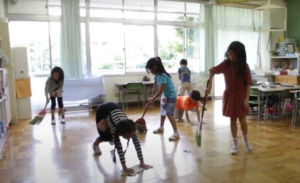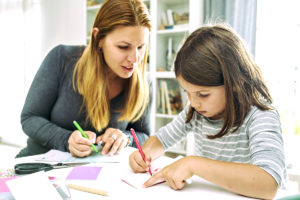Educational Options 2022
Your Child’s Educational Future: Questions Every Parent Should Ask Themselves
by Bob Doman
 Whether you have a gifted or typical child, a child with learning or attention issues or special needs, parents need to understand what their role is, and the role, if any, of schools.
Whether you have a gifted or typical child, a child with learning or attention issues or special needs, parents need to understand what their role is, and the role, if any, of schools.
More and more parents are realizing that the one size fits all education—just plug them in and let the chips fall where they may—just may not be doing the job for their children. Some parents are ready to explore the options and are looking for a long-term plan, while others want to help their children catch up or give them a boost so they can return them to school, but at the top of the heap.
This may be the time for a change.
Questions every parent should ask themselves:
Is parental involvement in a child’s development important?
Absolutely, and the more the parents are involved with their child’s development and education, the better. Parental involvement is the single greatest factor affecting a child’s development, education, and future.
Can parents be educators/teachers?
Parents are the child’s first, best, and most important educators/teachers. Who teaches children to understand and speak their language, a foreign language? Who teaches your children how to take care of themselves from feeding themselves to toilet training, to dressing, bathing, and grooming, etc.? Who teaches your child how to behave appropriately? Who teaches your children how to throw a ball, set the table, do the dishes, mow the lawn? Who teaches your children about family, respect, compassion, responsibility, faith, religion, and probably at least the basics of reading and math and more and more and more? The truth is that on graduation from high school, measuring what your child has learned as opposed to what they were “taught” and have forgotten, the odds are that what the children actually learned from involved parents significantly outweighs what the schools “taught.” Your child’s future as an adult is more a reflection of lessons learned from parents than schools.
Who knows your whole child best?
Involved parents know their child the best and are the only people who know their whole child.
Do teachers, therapists, psychologists, and doctors know your whole child?
No, they temporarily deal with pieces of your child, not your whole child. How often have you had a new teacher or any other professional for that matter go out of their way to ask you, the experts, about your child?
Who needs to be in charge and steering the ship, those who only think they understand your child, looking at pieces, or parents who know their whole child?
Parents. Those dealing with pieces of your child never do or can understand your whole child.
Whose vision of the child should be directing the outcomes?
Parents, your child is your child. Those working with your child should be helping you fulfill your vision.
Have parents been largely encouraged to abdicate their roles to the professionals over the last 50 years?
Yes, the trend has been to let the professionals take charge. Parents are often perceived as irrelevant or even as interfering pieces of the equation.
Are the teachers, schools, psychologists, etc. responsible for your child’s education and future?
These folks will often tell parents that they, the experts, are responsible, and you need to trust their training, their vision, and that you and your child need to follow their direction. The system doesn’t grade the teachers, psychologists, and therapists based on how your child does, they grade your children. They, the professionals, don’t fail, your child does. While they are well meaning, their role is limited and transient. Transients working with pieces of your child are not responsible for your child’s future. If they fail in their job, your child won’t be living in their basement when they’re thirty.
Should schools be viewed as a tool in the parent’s toolbox that they can choose to use or not, and if so to what extent?
For many families today, school is an option, not a foregone conclusion. Some families do not have a choice, but for those who do, school needs to be perceived as optional—there if and when needed.
If you take your child out of school, how hard is it for them to return?
In most states if you decide to take your child out of school, you can do it tomorrow. Just let the school know that you are going with another plan. In a few states it is a tad more involved, but not much. And generally, to put them back in requires nothing more than contacting the school. For some children a placement test may be part of the process; but every child can attend public school when the parents choose, with the possible temporary exception of children who have been expelled. The bottom line is that it is rarely an issue to remove your child from school or to put them back in.
Ultimately who is responsible for your child and their future?
You are!
Do children with learning and attention problems, with special needs or the gifted require schools to address their specific individual needs?
The reality is the educational system is not able to individualize and provide for “typical” children, let alone those with greater needs. Children in need of specific therapies need those therapies multiple times per day, not once or twice a week for 30 minutes. That is what the school can provide, not what the children need. At best schools can plug children into different levels of their curriculum or change the pace, but they do not and cannot create curriculums to fit individual children.
Is group/classroom, or set curriculum an efficient, effective way to educate?
Group/classroom instruction is a means to mass education but is by no means the best way to educate an individual. Individual targeted education is by far more efficient and effective, and the younger the child the more important it is. Two minutes of targeted 1:1 education for younger children or those with special needs can easily be more effective than an hour of group, set curriculum-based education.
Do children need to attend schools for their social development?
Social interaction in most schools occurs at minimally supervised times, such as recess, in the hallways and restrooms. If your child is not learning how to interact socially at home, they will often have social issues at school. And school provides a great opportunity for bullying, and the greater your child’s need for positive social interaction, the greater the targets they are for exclusion and bullying. There are many supervised social opportunities that exist outside the school setting that afford better opportunities for social engagement than school, including church groups, Scouts, 4H, community sports, and martial arts, not to mention family, extended family, and so on
What education can and should be: home-based education
Many parents who had previously just assumed that their children had been receiving a good, if not quality, educational opportunity are starting to pay attention. “Virtual” schooling gave many parents a better look into their child’s curriculum than ever before; and many were rather shocked at how inappropriate much of it was for their child and how far it was removed from fitting or targeting their child.
The reality is that mass education, schools, and set curriculums are not producing good or what should be considered acceptable results for most children, even if our children apparently are doing well. The United States in 2018 ranked 30th in math, 8th in reading, and 11th in science internationally. So much for the myth that we have a great educational system. It is certainly nothing to brag about. And to maintain perspective, think about what countries might rank above the U.S. and how good their educational systems actually are.
Many families are beginning to really examine school as they now see it to be and are considering alternatives. At the same time many work and home situations have changed; and as a result, more and more parents are finding that they can work from home for at least part of the day, or that they can do fine on one salary,weighing a new car when the old one runs just fine against assuming a more active role in their child’s education and future. If one parent could be home educating the children, even if for part of the day, it opens alternatives that may not have been perceived before. We tend to forget what was, but to gain perspective, in 1967 49% of mothers were stay-at-home moms. That number dropped to 23% in 1999 and has climbed a bit, but is still only 29%.
Many parents see their options as perhaps more limited than they need to be. The options list often includes public school, charter schools, or private schools, which are often prohibitively expensive and not necessarily better than public schools. Or there are home-based online schools that just plug children into a curriculum and keep them attached to a screen all day. Or traditional homeschool that tends to take up most of the child’s and parent’s day and just replaces one packaged curriculum for another. Packaged curriculums that children are plugged into are the bane of education and disregard our children as unique individuals. They ignore neuroplasticity and the value of targeted input, the child’s interest in and relationship to the input, affecting the intensity of the input and the effect on the brain.
What most folks think of as homeschool is not at all what home-based education started out being or can be. Homeschool as most parents think of it is essentially recreating school at home. A ton of curriculum/”stuff” that no one really expects the child to learn, nothing targeted, nothing specific to the child, and like school, most likely to produce less than stellar results.
There is one huge piece missing from school and many homeschool curriculums—the child. What is taught, when, and how should be based on the child, the child’s level of development, their processing ability (link to Processing article), the child’s level of academic function, the child’s interests, the understanding of the needs of the whole child, and the vision. The needs of the whole child go way beyond curriculum, including turning the child on to learning, making them readers, and learning to love learning, learning that they don’t need to be hand fed to learn (they can do it themselves), teaching the child how to think, be responsible, including owning chores, and how to take care of themselves from cooking to laundry. From how to earn, save, invest, and how to learn about and even engage in entrepreneurship, to having an adult rather than peers teach them about appropriate behavior, morality, faith, respect, values, family, etc. Providing them with an opportunity to develop strong processing, short-term and working memory, which translates into greater maturity, better executive function, and simply, being smarter; and to have the encouragement and flexibility to explore and develop their interests, talents, and passions.
Achieving our vision for our children requires much more than classes and grades, and if we understand the reality of the needs of our whole child, we understand the reality that the time and energy required by school or packaged curriculum does not leave the time and energy to put together the whole package, the whole child. Targeting academic education to fit the child is so efficient that the time needed to educate them per day is a fraction of what school or typical home school requires.
The parent’s job is to turn their children into happy, well adjusted, successful, contributing adults who have the tools to succeed at something they are passionate about. Giving birth is just the beginning; the job, the responsibility, and the privilege of parenting involves years of active participation.
Unfortunately, many parents do not start off with a vision. But all parents need a vision of what their child—this wonderful, unique new person—can be. Start with that vision, then actively work with your child, getting to know them and permitting them to learn and understand, and you can then together continue to develop the vision and bring it to fruition.
As someone once said, “Look where you’re going and go where you’re looking.” Take responsibility and take charge.
Reprinted by permission of The NACD Foundation, Volume 35 No.2, 2022 ©NACD
Related Articles

NACD: A Game Changer for Our Daughter

Why Should I Move to Home Education This Year?

NACD Homeschool & Home Education FAQ

Feedback and Its Impact on Behavior, Learning, Development, and More – Part 5

Simply Smarter: Intensity – How to Achieve the Best Results

School Year 2020-2021: What to do, what to do? Homeschool or a variation of it?

NACD Targeted Home-Based Education: The Vision and the Plan

Teaching Chores Better Than Teaching Algebra?

Feedback and Its Impact on Behavior, Learning, Development, and More – Part 4





